Some highlights

Peter Van den Eede and Bas Teeken meet at the Royal Conservatoire of Antwerp, then headed by Dora Van der Groen. Two years after they graduate, they make De Gebiologeerden. The premiere, on May 27th 1989 in the Zwarte Zaal (Black Room) of the Royal Conservatoire of Antwerp, marks the beginning of Cie. de KOE.

In 90-91 de KOE – under the aegis of the theater company De Tijd – goes on tour with a reworked and stripped-down version of De Gebiologeerden, which receives raving reviews and makes a name for the company.
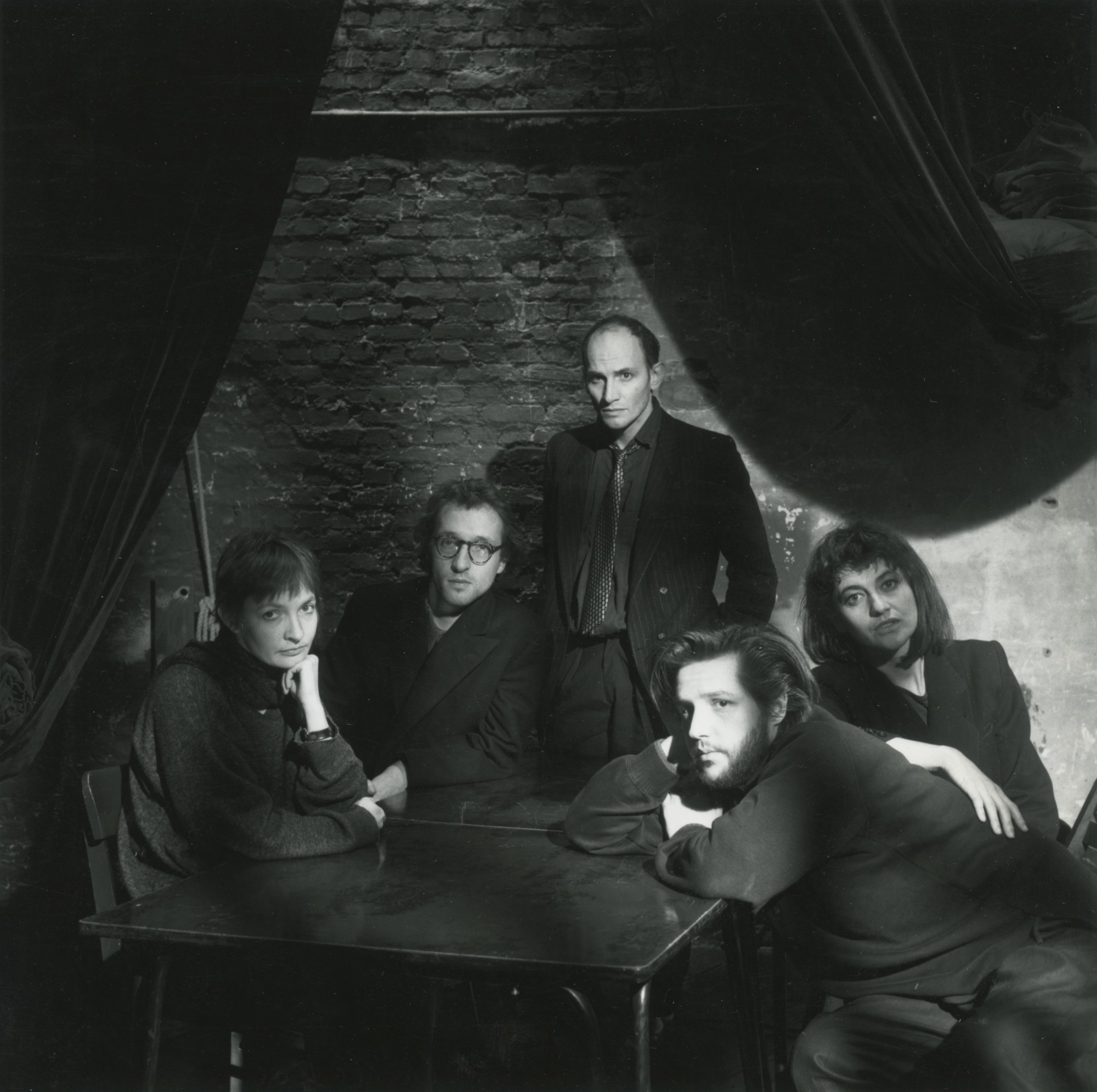
With de KOE’s second production, Epiloog van de Eenzaamheid, a number of new actors are introduced: Diane Belmans and Dirk Tuypens – who will remain connected to de KOE in the coming years – and Els Olaerts.

Steven Van Watermeulen and Frank Focketyn also form a part of de KOE in the nineties, in productions like De Touroperator and the actors’ scene in Ivo van Hove’s Hamlet.

In 1993 de KOE is officially recognized by the Flemish community and receives structural subsidies. With Drie Koningen (Steven Van Watermeulen, Frank Focketyn, Koen De Bouw) and the performance-installation De rest is overschot (What’s left is leftovers), they make two pieces related to the theme of ‘power’.
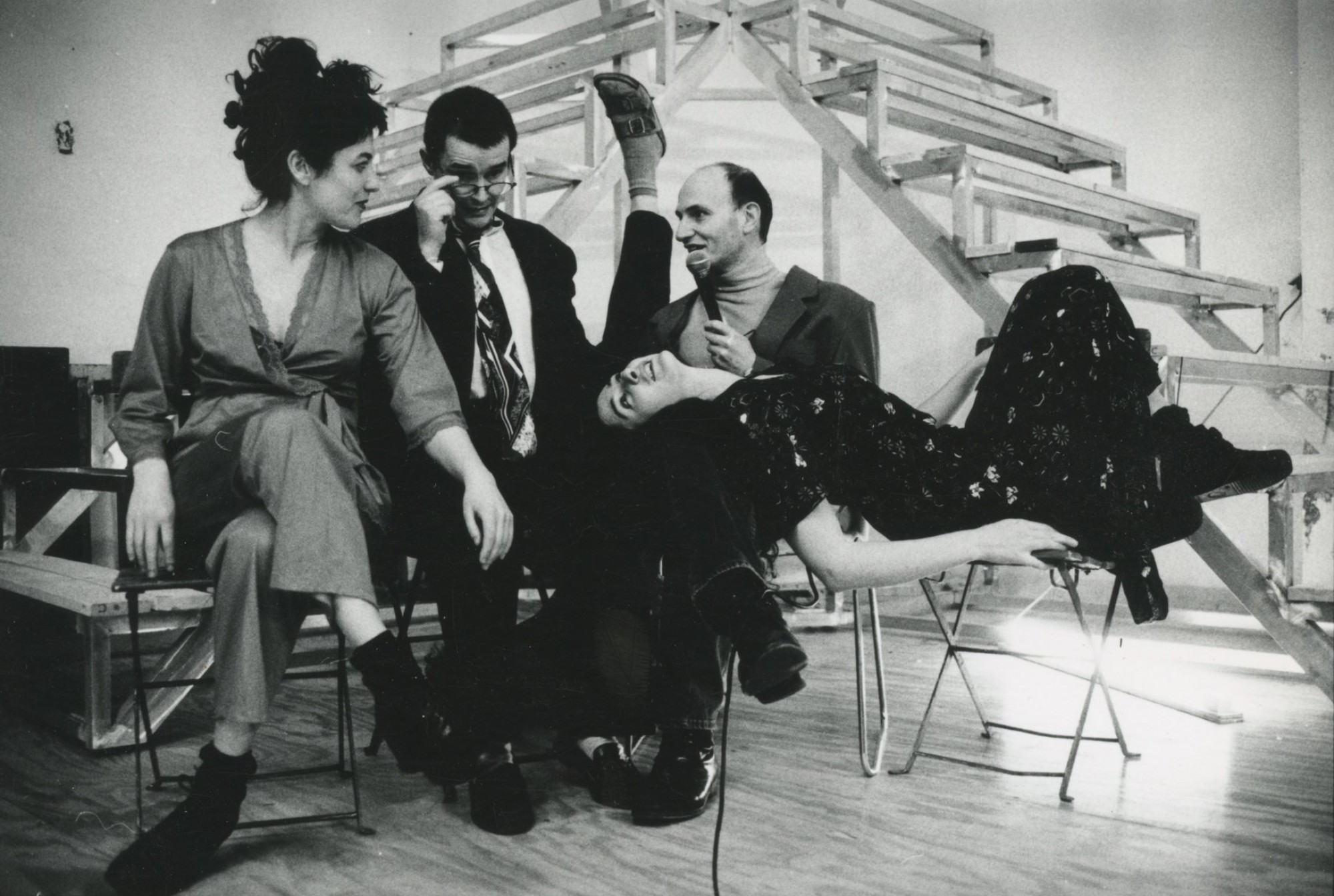
In 1994 the new production Monoloog geterroriseerd goes on tour and work begins on Talkshow I, a play inspired by the well-known television format, with a number of regulars - Focketyn, Teeken, Van den Eede, Belmans – and Tamar Van den Dop. In 1999 the concept is repeated on a larger scale in a coproduction with Het Toneelhuis. Mark Uytterhoeven and Tom Lanoye are at the helm of this project.

De KOE invites the author J.M.H. Berckmans (center) to write a play for them. In the end, there will be no new text by Berckmans, but a piece based on his short stories, called De Menagerie van de Schamele Drie.

As with De Menagerie van de Schamele Drie, Hilde Van Mieghem joins Peter Van den Eede and Frank Focketyn on stage for In De Gloria.
Van den Eede: “In De Gloria plays with the impossible paradox of a drama without drama, a conflict without conflict. Nothing erupts. Or does it? The ball is in the audience’s court. Where one person sees terror and agression against human nature, the other experiences a climax of love.”
In ’96, Frank Focketyn also makes Titel onbekend (Title Unknown) with Warre Borgmans.
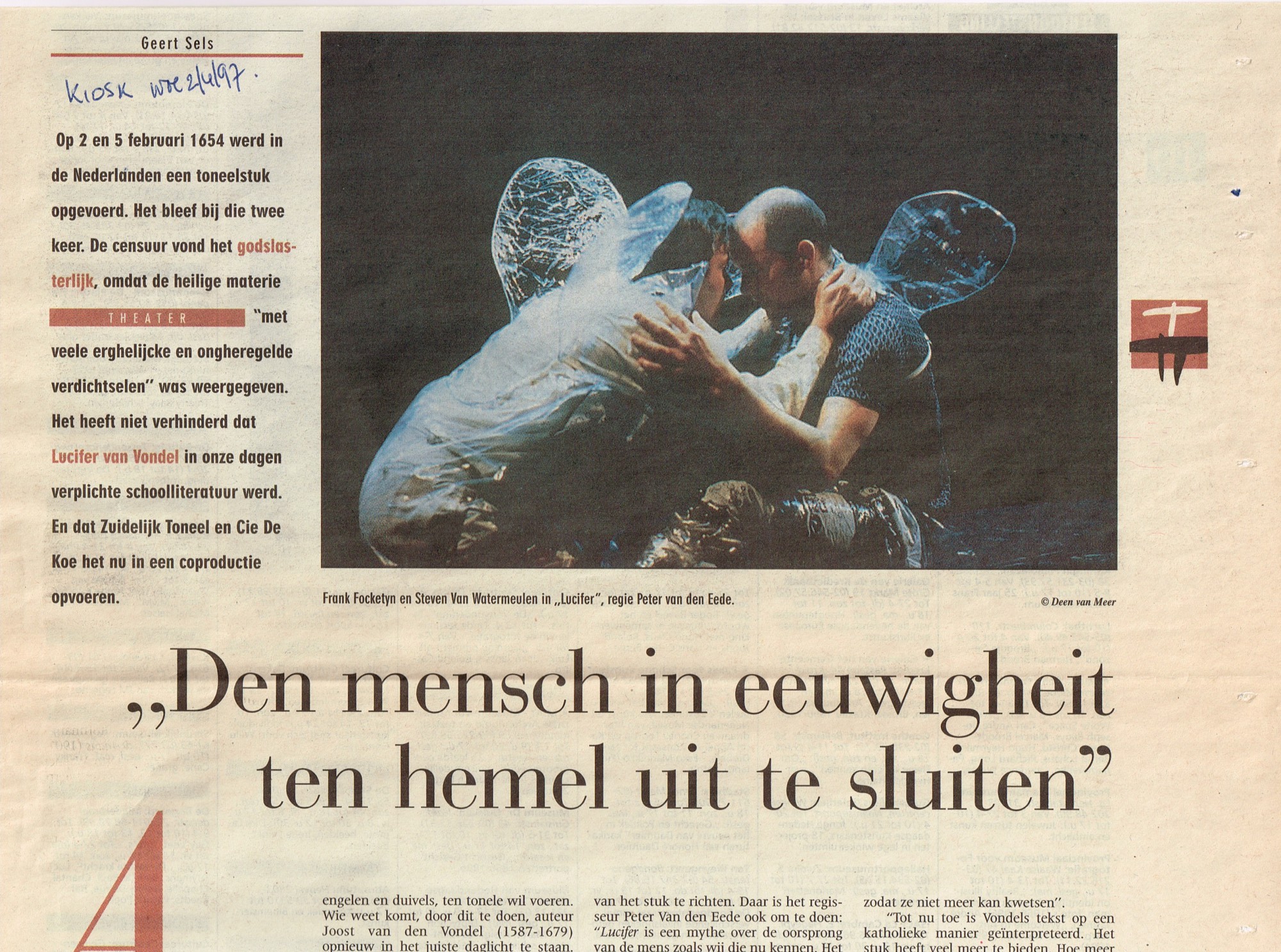
KOE-actors Frank Focketyn and Steven Van Watermeulen get on stage with the actors of Het Zuidelijk Toneel in Peter Van den Eede’s version of Vondels Lucifer. “Lucifer is not a totally different direction for me,” says Van den Eede. “It’s an extension of something I have been working on for years. The reason I make theater is because I am looking for the origin of things, or why we do things, for the roots of our desire for knowledge and our compulsion to communicate… if you start thinking about that, you arrive at the origin of mankind.”
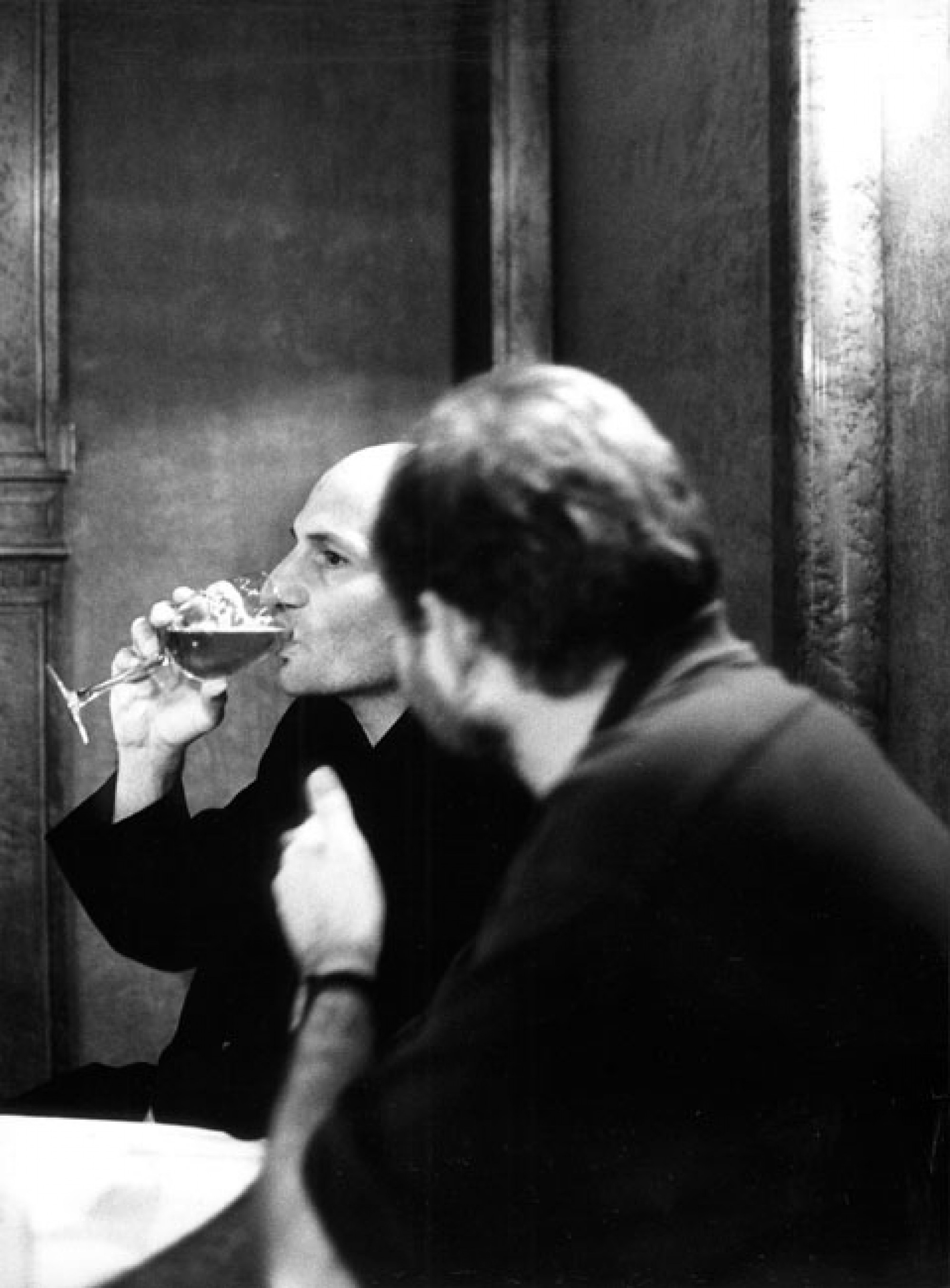
My Dinner with André is the first of many collaborations between tg STAN and de KOE, both founded in ’89. After a first critical response by press and audience alike, the piece becomes a cult hit, winning several prizes. Damiaan De Schrijver and Peter Van den Eede have been playing it for over twenty years and counting.
Other KOE-productions in ’98 are De Slag van Glottis (The Battle of Glottis) - with Sien Eggers, Anne De Wilde and Luc Nuyens - and De Nijl is in Caïro aangekomen (The Nile has arrived in Cairo).

In the late ’90s new actors join de KOE, while others leave. Bruno Vanden Broecke and Katelijne Damen enter the company in ’98 and ’99. Together with Peter Van den Eede, Damen takes up the artistic leadership of the company for a couple of years.
Freelancers such as Lucas Van den Eynde en Sien Eggers, who were in a production by de KOE in resp. 2016 and 2018, make their first appearance during this period. Aside from Talkshow II, in ’99 de KOE makes the coproduction Het Jachtgezelschap (The Hunting Party) (after the text of Thomas Bernhard) with tg STAN.

In 2000 Peter Van den Eede supervises IO, the graduation project of the brand new company SkaGen (Yves Degryse, Valentijn Dhaenens, Korneel Hamers, Mathijs Scheepers and Clara Van Den Broek, on stage here with Bruno Vanden Broecke). The coming years he continues to be involved in the theater school of the conservatoire.
In the same year, Katelijne Damen makes De Liefde Het Is (Love It Is) together with Frans Van der Aa and Jan Steen.

Stefaan Van Brabandt first appears in the Woody Allen-pastiche Van alles naar Allen (with a.o. Barbara Sarafian, Roselien Dhaenens, Bruno Vanden Broecke and Clara van den Broek). For over a decade, he will be one of the driving forces behind de KOE. In the same season, Peter Van den Eede makes In den beginne... Squirrels (In the beginning... Squirrels) with Vanden Broecke, a piece based on David Mamet’s text. With Katelijne Damen, he makes Elisabeth & Essex.
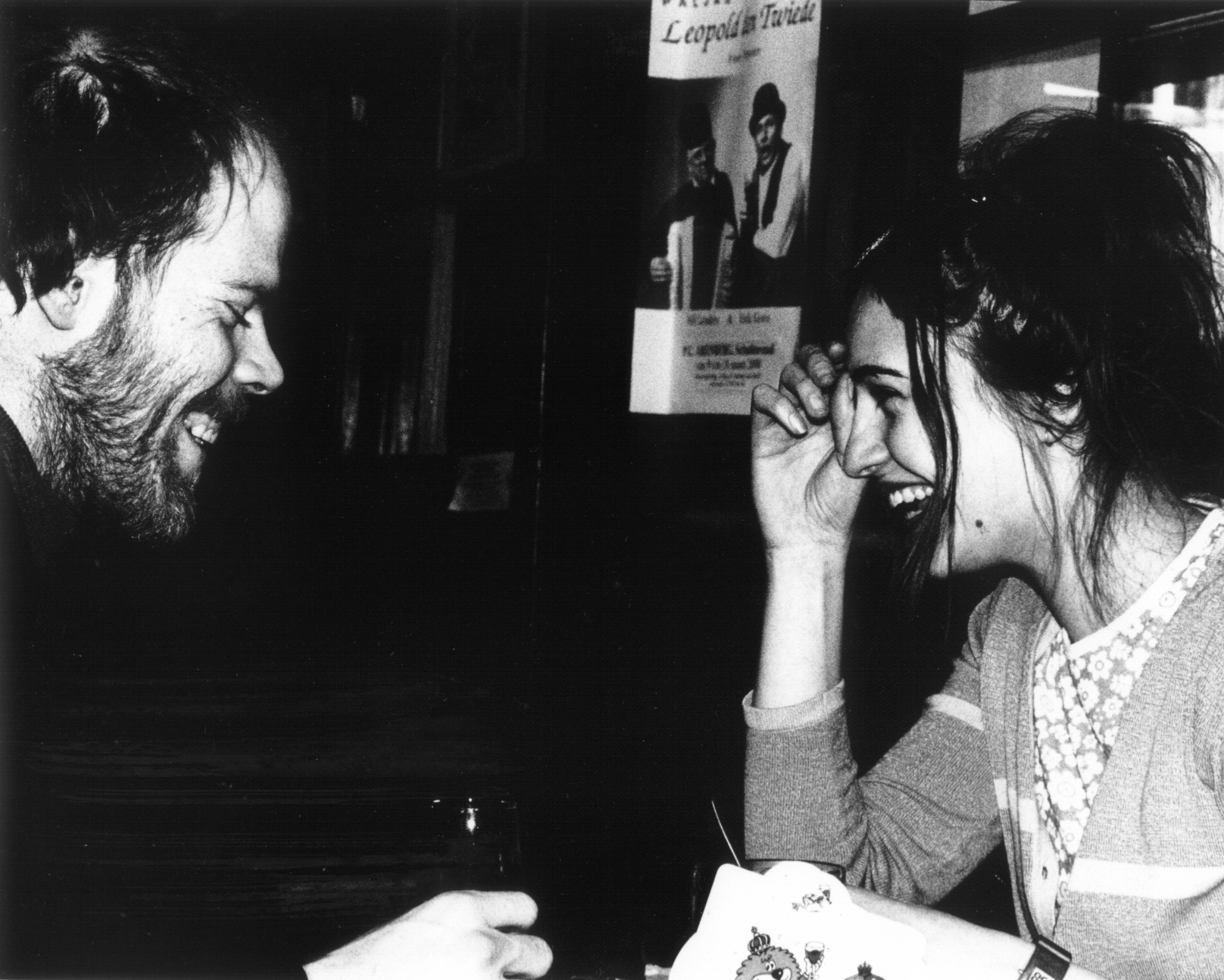
In 2002, a recently graduated Natali Broods plays in two productions by de KOE: Kleine Bezetting (Small cast), a piece she creates together with Bruno Vanden Broecke, and in the coproduction Drie Zusters (Three Sisters) with tg STAN.
That year Peter Van den Eede and Damiaan De Schrijver work on another polycoproduction, together with Matthias de Koning, resulting in the iconic Vandeneedevandeschrijvervandekoningendiderot, after Diderots Paradoxe sur le Comédien.
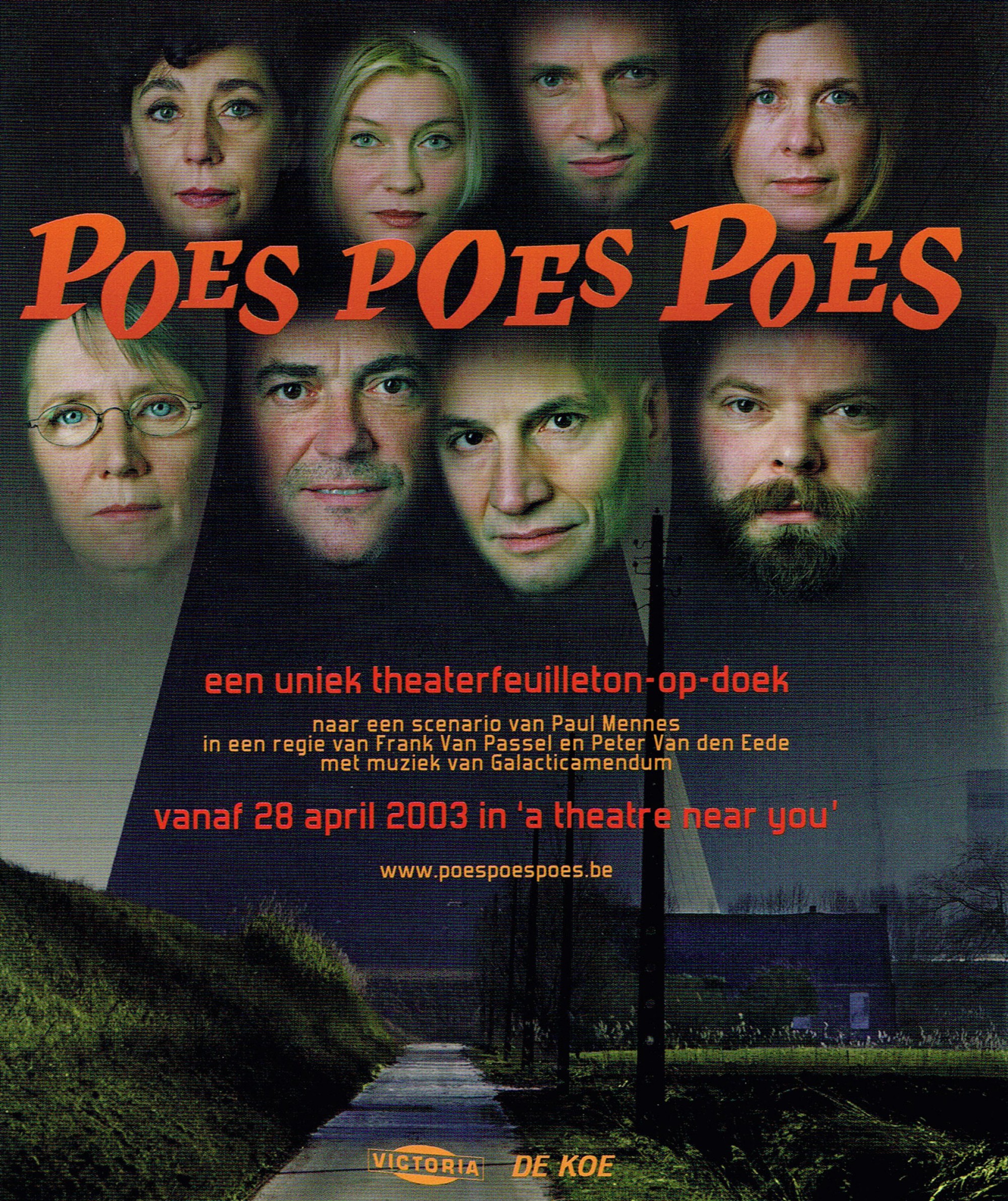
Poes Poes Poes is an expansive experiment, a television show that can be followed in theaters on a weekly basis and disappears afterwards, with a number of stars from the Flemish theater and television world, a script by Paul Mennes, and directed by Frank Van Passel, who is known for the acclaimed series Terug naar Oosterdonk (Back to Oosterdonk).
2003 is a busy year for de KOE: the company is also touring with Quarantaine (Quarantine), De miserie van de jonge Werthers (The Young Werther's misery), Drop Dead Money and the French version of Vandeneedevandeschrijvervandekoningendiderot (Du serment de l'écrivain du roi et de diderot).

In 2004, Johan Daisne’s magic-realist novel De man die zijn haar kort liet knippen is already said to be outdated. But the eponymous play by Natali Broods and Peter Van den Eede will become a timeless classic, with a French version touring in 2014. The piece is based on the ideas in the book, without literally following the same storyline
Van den Eede: “I don’t think you need a full story to achieve depth. A story distracts, the essence is underneath. I like to reveal as little content as possible by letting the form define as much as possible. To create as much music as possible with as little notes as possible.”
Aside from this intimate dialogue, in 2004 de KOE also plays De Wet van Engel (Engel's Law), with a sizeable cast: Nico Sturm, Bas Teeken, Stefaan Van Brabandt, Clara Van den Broek, Bruno Vanden Broecke, Maarten Westra Hoekzema and Koen De Bouw/Gène Bervoets.

In 2005, Peter Van den Eede / de KOE is the guest of honor at Theater Aan Zee. Four plays are resumed: De Gebiologeerden, De wet van Engel, De miserie van de jonge Werthers and In den beginne... Squirrels. De KOE also invites like-minded companies, such as De Onderneming (split into Lazarus and comp. Marius in 2006) and Maatschappij Discordia. On the closing night of TAZ#2005, the singing and playing actors from the company turn Café Koer into Café KOE with a swinging closing concert.
But 2005 was not just about reprisals: the premieres of Who’s afraid of Virginia Woolf and Millernin and the first French tour of My Dinner with André also took place that year.

Utopie van het Atoom is the last piece Bruno Vanden Broecke makes with de KOE.
“Both the scientist and the artist delve into deeper grounds, both fascinated by the origin of life. One captivated by what is true, the other by what is truthful.” (Peter Van den Eede)

In Glanzen, a coproduction with Pieter De Buyssers Lampe, Peter Van den Eede and Sien Eggers play David Copperfield and Claudia Schiffer. De Morgen calls it an ideal coproduction: “What is the alternative for acting? For de KOE it’s always an evening of unaffected chit-chat, for writer-director De Buysser it is a search for a discerning state of being that goes beyond the ‘illusion of art’. Those two artistic lines meet beautifully in Glanzen.” (Wouter Hillaert)
In 2007, Nico Sturm also makes a new production, together with Evelien Broekaert, Stefaan Degand, Pol Geusens and Nick Timmermans: the musical play Burgerlijke Ongehoorzaamheid (Civil Disobedience).

The polycoproduction Onomatopee brings together no less than four companies: de KOE, STAN, Maatschappij Discordia and Dood Paard, with as a fifth the freelancer Willem de Wolf. Matthias de Koning introduces Willem to the club, eventually Peter Van den Eede will invite him to join his company.
De KOE also travels to France, with Qui a peur de Virginia Woolf, based on the Dutch version from 2005.

To celebrate their 20th anniversary, KOE-actors Sien Eggers and Nico Sturm get on stage with Jan Decorte and Sigrid Vinks for the piece Een gelukkige verjaardag, based on the well-known documentary Grey Gardens. In a later phase of their career, Decorte was one of the most important influences for de KOE, aside from Maatschappij Discordia. This makes this collaboration extra meaningful.
In 2009 de KOE also tours the new piece Laat op de avond na een korte wandeling (Late at night after a short walk).

In Wit de KOE returns to the raw, the naive quality of beginning. Wit is also the beginning of the most recent chapter in the history of de KOE: the current artistic core group of Peter Van den Eede, Natali Broods and Willem de Wolf. In the following years they complete the trilogy De Wederopbouw van het Westen (The rebuilding of the West) with Rood (Red) and Zwart (Black).

Peter and Natali tour around France with Outrage au Public, after Peter Handke’s Publikumsbeschimpfung, together with Gène Bervoets, Marijke Pinoy and Sofie Palmers. Peter made the original version in 2006 together with a group of students from the conservatoire - Thomas Ryckewaert, Jonas Van Geel, Oscar Van Rompay, Barbara Vanwelden, Fran Verstegen and Ward Weemhoff - as their graduation project, and afterwards they played the piece under the aegis of de KOE.
In the same year Willem de Wolf makes Krenz, de gedoodverfde opvolger (Krenz, the designated successor) - the capstone of his studies in German culture and linguistics.

Informally they call themselves “the boys”, even though Sara De Roo has also joined the polycoproduction. First in We hebben een/het boek (niet) gelezen (We haven't read a/the book) in 2010 and in 2012 for Beroemden.

The idea behind Olga was: what if, instead of playing a Tsjechov, we just write a new one? For the first time, daughter Ans Van den Eede also acts in her father’s company.
Also in 2013, Willem de Wolf makes Vermogen (Capital), together with Lineke Rijxman of Mugmetdegoudentand. De wederopbouw van het westen is presented as one 4,5 hour long marathon performance.

In The Marx Sisters, a coproduction with tg STAN, Natali Broods and Sara De Roo play the daughters of Marx. Willem de Wolf wrote the text and also plays in the piece. De Wolf: “I grew up in a family where political discussions were a part of the family tradition. In theater, in literature, in every artwork I look for philosophical and social reflection. That is my definition of art: it stimulates how you think about society and about how we can change or improve it.”

In collaboration with Théâtre Garonne in Toulouse Peter, Natali and Willem bring a French version of their ambitious trilogy WitRoodZwart: de Wederopbouw van het Westen.

“Of course, we’ve never done Tsjechov literally. Just like we won’t do a Beckett this time. A previous piece, Olga, started off as a pastiche on Tsjechov, but gradually moved beyond that, until we reached a universe that was almost Beckettian. The absurt immobility of the one is escalated by the other.” (Peter Van den Eede over Beckett Boulevard)

After Olga de KOE goes for another big ensemble production: for HelloGoodbye Michael Vergauwen, Ans Van den Eede en Sien Eggers join the crew again, together with newcomers Tanya Zabarylo and Mats Vandroogenbroeck. In 2017 there is also a first collaboration with Antwerp-based company De Nwe Tijd: the German-Flemish coproduction ForsterHuberHeyne. With Myriam Van Imschoot and a series of volunteers Willem de Wolf makes the musical play IN KOOR!

Leading up to their anniversary in 2019 de KOE dusts off two important pieces from their history: Krenz, de gedoodverfde opvolger (fall 2018) and Who’s afraid of Virginia Woolf (spring 2019).

De KOE turns 30 and celebrates with ACHTER/AF, a play about looking back and moving forward!

